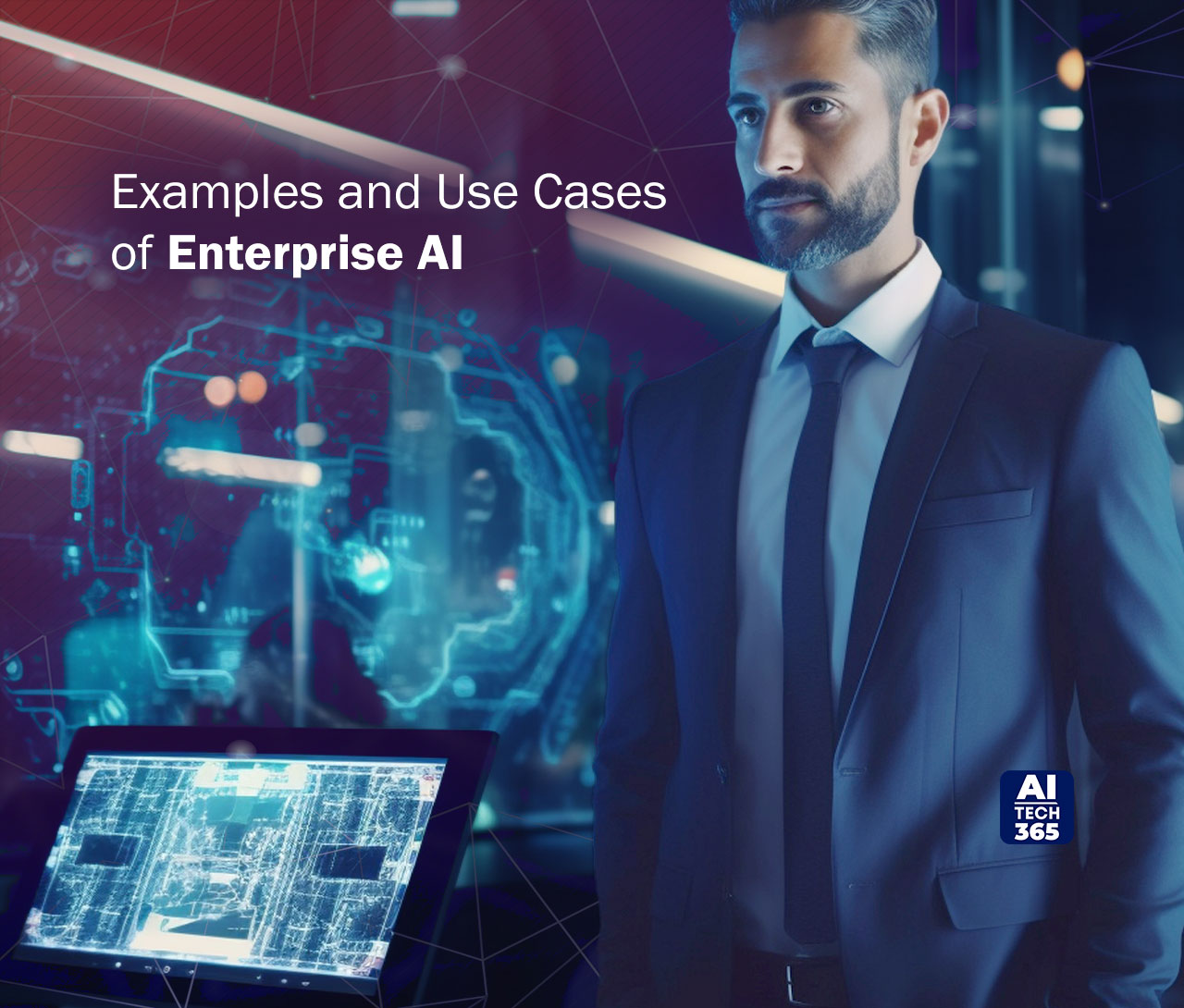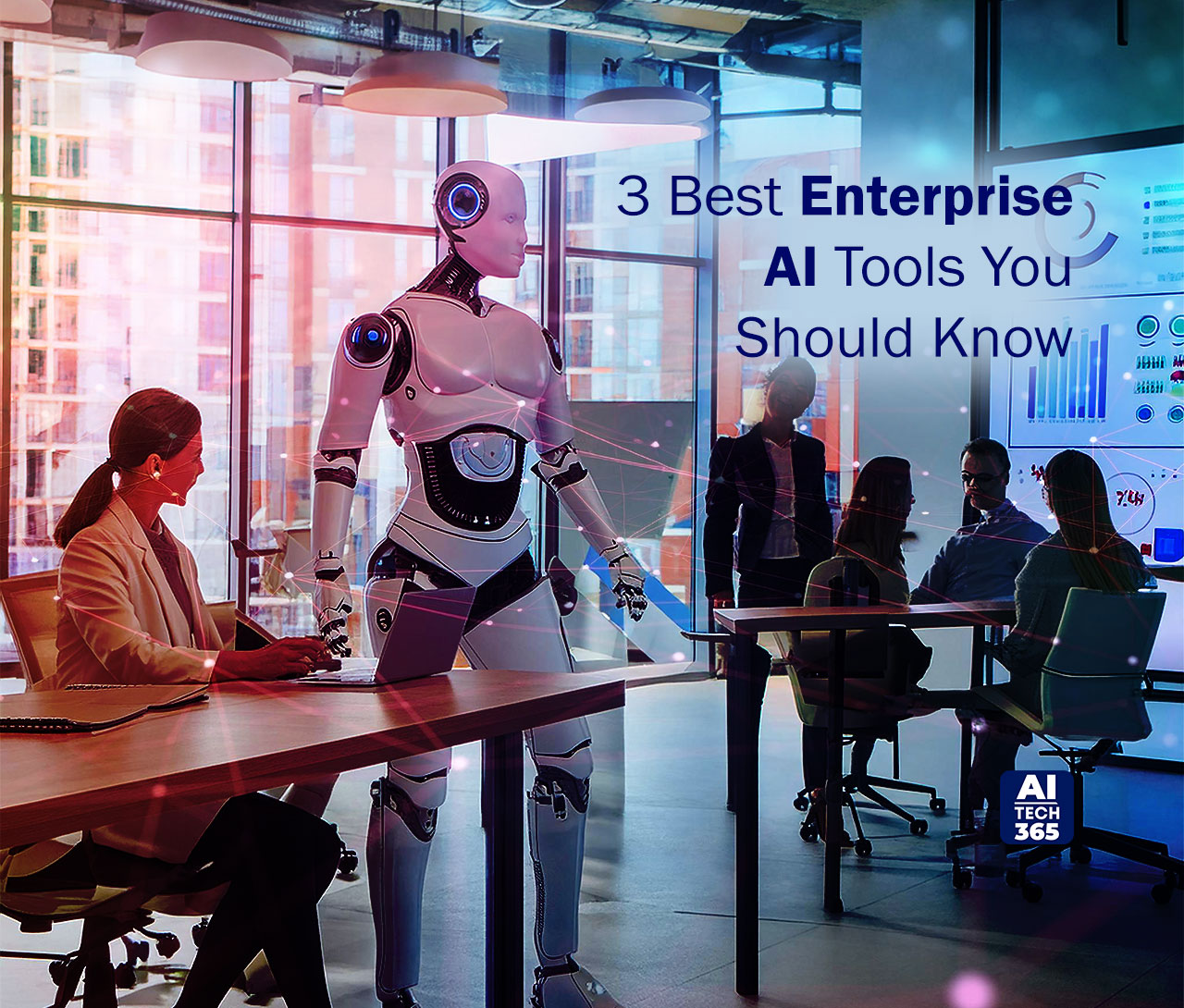In today’s complex and data-driven business landscape, organizations face numerous challenges, from inefficient processes and limited insights to high operational costs and suboptimal decision making. This is where enterprise AI, a transformative solution that harnesses the power of artificial intelligence and data analytics comes into play. Read on to know more about it in this article.
What is Enterprise AI?
Enterprise AI refers to the integration of advanced AI technologies within large organizations to enhance various business functions. It covers a wide range of activities, from basic tasks like data collection and analysis to more complex operations such as automation, customer service, and risk management.
At its core, enterprise AI relies on sophisticated AI software tools that utilize cutting-edge methodologies like machine learning, natural language processing (NLP), and computer vision. These technologies empower organizations to automate processes across different use cases, streamline complex business functions, and eliminate repetitive tasks while harnessing the full potential of their data.
By leveraging AI to analyze data, companies can gain valuable insights into key performance indicators (KPIs) and refine their business strategies accordingly. However, the path to digital transformation through enterprise AI is not without its challenges. It requires significant investments in technology infrastructure and the recruitment of skilled personnel to implement these systems effectively.
Examples and Use Cases of Enterprise AI
Enterprise AI finds extensive applications across various domains, showcasing its versatility and transformative potential:
- Supply Chain Optimization: AI tools forecast product demand, optimize inventory levels, and detect potential disruptions, ensuring smooth operations and reducing costs in the supply chain.
- Financial Fraud Detection: AI algorithms analyze transaction patterns to detect fraudulent activities, mitigating the risk of financial fraud in banking and online transactions, where security is paramount.
- Personalized Marketing: AI analyzes customer data to create tailored marketing campaigns, improving engagement and sales by offering personalized product recommendations and advertisements.
- Enhanced Customer Service: AI-powered chatbots and virtual assistants provide efficient round-the-clock customer service, learning from interactions to offer increasingly effective support over time.
- Human Resources Management: AI platforms assist in resume screening and candidate matching, streamlining recruitment processes, and analyzing employee data to inform training and retention strategies.
- Cybersecurity Threat Detection: AI systems analyze network traffic to identify and mitigate potential cybersecurity threats, detecting anomalies and breaches before they cause significant harm.
- Healthcare Diagnostics and Research: AI technology aids in diagnosing diseases, analyzing medical images, and predicting patient outcomes, speeding up the diagnostic process and enhancing the accuracy of medical findings.
3 Best Enterprise AI Tools You Should Know
NVIDIA AI Enterprise is a cloud-native platform speeding up data science pipelines and streamlining AI app deployment and development. It includes tools like the NVIDIA TAO Toolkit for creating customized AI models, SDKs in the NVIDIA Metropolis intelligent video analytics platform, and the NVIDIA Merlin framework for building recommender systems at scale.
C3 AI provides an integrated suite of development tools, including deep code, low code, and no code options, within a collaborative environment. Their platform, C3 AI Studio, facilitates rapid development, provisioning, and operation of enterprise AI applications, supporting industry-standard tools like Jupyter Notebook, R, Python, and Scala.
Tether AI is an AI-powered search tool leveraging OpenAI GPT-3. It enhances the search experience by providing advanced functionalities, allowing users to search the web, take notes, and edit them within the platform. Tether AI harnesses AI capabilities to deliver tailored search results.
Benefits of Enterprise AI
Enterprise AI offers several advantages for organizations:
- Improved Efficiency and Productivity: AI automation can streamline processes, reduce manual effort, and increase operational efficiency. By automating repetitive tasks, employees can focus on higher-value activities, leading to increased productivity.
- Enhanced Decision Making: AI analytics provides organizations with data-driven insights and predictive capabilities, enabling better decision making. By analyzing large volumes of data, AI can identify patterns, trends, and correlations that humans may overlook.
- Personalized Customer Experiences: AI enables organizations to deliver personalized experiences to customers. By analyzing customer data, AI can provide tailored recommendations, personalized marketing campaigns, and improved customer service.
- Cost Reduction: AI automation can help organizations reduce costs by optimizing processes, minimizing errors, and improving resource allocation. By automating tasks, organizations can achieve operational efficiencies and cost savings.
- Improved Risk Management: AI analytics can assist in identifying and mitigating risks. By analyzing data and detecting anomalies, AI can help organizations proactively manage risks and make informed decisions.
- Enhanced Security: AI can strengthen security measures by detecting and preventing potential threats. AI-powered systems can analyze large amounts of data in real-time, identifying suspicious activities and protecting against cyber threats.
- Scalability and Flexibility: AI technologies can scale and adapt to changing business needs. AI systems can handle large volumes of data and can be easily scaled up or down based on demand.
Challenges of Enterprise AI
While enterprise AI offers numerous advantages, there are also challenges that organizations need to address:
- Data Quality and Availability: AI relies on high-quality and relevant data. Organizations may face challenges in ensuring data quality, dealing with data silos, and accessing the necessary data for AI initiatives.
- Ethical and Regulatory Concerns: The ethical use of AI, including issues of bias, privacy, and transparency, is a significant challenge. Organizations must navigate ethical considerations and comply with regulations to ensure responsible AI deployment.
- Integration and Compatibility: Integrating AI systems with existing infrastructure and legacy systems can be complex. Ensuring compatibility and seamless integration with existing processes and technologies is a challenge.
- Explainability and Interpretability: AI algorithms can be complex and difficult to interpret. Organizations may face challenges in explaining AI-driven decisions and ensuring transparency, especially in regulated industries.
- Change Management and Adoption: Implementing AI technologies requires organizational change and user adoption. Organizations must address resistance to change, provide training, and ensure smooth adoption of AI systems.
- Cost and Return on Investment: Implementing AI can involve significant upfront costs, including infrastructure, talent, and ongoing maintenance. Organizations need to carefully evaluate the return on investment and justify the costs associated with AI initiatives.
Key Takeaway
Integrating enterprise AI into current workflows can significantly enhance efficiency and precision. Yet, it’s essential to grasp the obstacles linked with its deployment, like the absence of internal expertise, compatibility concerns, and regulatory obstacles, prior to embarking on a project. Selecting the appropriate AI partner is critical for navigating the implementation process successfully.


